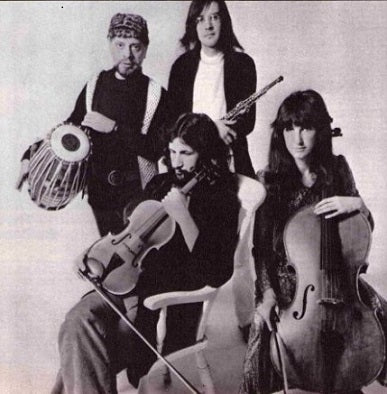In April this year we released a 2 CD compilation from Third Ear Band featuring the album Songs from The Hydrogen Jukebox along with a live recording originally released in 1996.
As the 1960s morphed into the 1970s, British Record companies began to explore how best to record, market and exploit the burgeoning ‘Progressive Rock’ movement that was taking flight in the domestic Rock music marketplace. The long playing record was the medium which allowed musicians to develop and stretch out their musical expression. Moreover, record companies set up new, dedicated labels to showcase their new ‘Progressive’ signings. RCA Victor had their own Neon label, Pye Records had the Dawn label, Decca Records set up the Nova imprint; and EMI launched Harvest Records.
Artists such as Pink Floyd, Deep Purple, and other acts such as Michael Chapman, Quatermass, Bakerloo, Kevin Ayers, Dr Strangely Strange were all signed to Harvest. The label, in keeping with just about all other Prog imprints, would use the inner dust bags of albums to advertise the various acts on their label, and issued a classic double sampler set called Picnic, in 1970 which was hugely popular at the time, and which featured ‘Water’ by Third Ear Band, from their self-titled second album, as the opening track on side three of the album.
Third Ear Band was much more than a standard rock band of the Guitar/ Bass/ Drums variety. The band’s notional leader, percussionist Glen Sweeney, had his musical roots in the British musical avant-garde, and had worked in combos such as the Giant Sun Trolley and Hydrogen Jukebox, playing shows and ‘Guerrilla’ events at places such as the UFO Club, and, perhaps most memorable of all, the 14 Hour Technicolour Dream at the Alexandra Palace in North London, on Saturday 29th April 1967. By August of that year, however, Giant Sun Trolley had split and Sweeney was formulating the idea of the Third Ear Band.
TEB started appearing on all manner of gigs, impromptu gatherings, concerts, festivals, etc. Their notoriety spread, no doubt in part because of their unusual instrumentation – percussion, cello, electric guitar, oboe / woodwinds – and their sound and style was unique, even by the frequently out-there nature of contemporaries such as the Incredible String Band and many others. Yet, given the unusual sound and structure of the band, they nonetheless struck a chord with the counter-cultural crowd, and their albums actually outsold many of their more (seemingly) commercial or critically-acclaimed contemporaries.
The band fell into the orbit of the management company Blackhill Enterprises, who back then were leading lights in the Progressive Rock scene – looking after the likes of Pink Floyd, Michael Chapman, Edgar Broughton and Kevin Ayers, who, like TEB, were signed to the Harvest Records label. Blackhill also organised several free concerts at London’s Hyde Park, including the Rolling Stones show on July 5th 1969, their first gig following the departure and death of Brian Jones – and TEB opened the show.
1970 was the high water mark for TEB. They toured the UK as special guests of Al Stewart, but also played concerts and festivals in France, Holland, Belgium and Germany, as their notoriety grew. TEB were also asked to provide the music for the film MacBeth, directed by Roman Polanski, in 1972 but by the end of that year, the TEB concept seemed to have run its course. By the late 1980s, however, the TEB sound – its emphasis on drones and trippy musical excursions – found something of a new audience with New Agers and those aficionados of the Rave scene and the band reformed, still led by Glen Sweeney and continued to record up until the late 1990s.
With thanks to Alan Robinson

